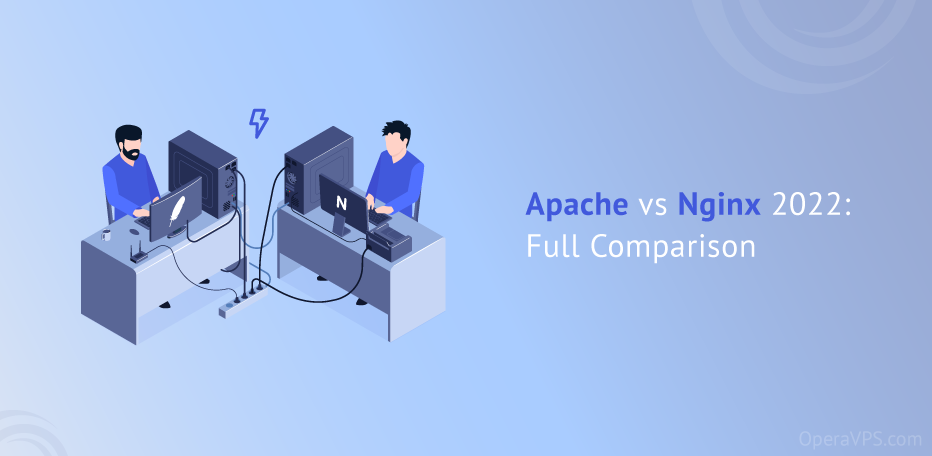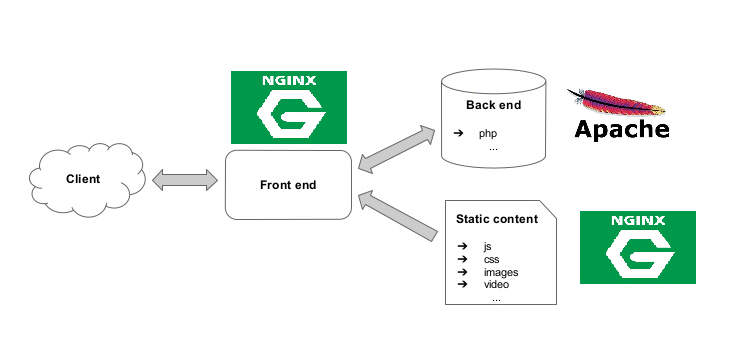
Apache vs NGINX
In the world of web servers, Apache and Nginx are the most popular to host our web resources. These two open-source web servers, serve over 50% of traffic on the internet, but they are not exactly the same. In this article, you will review a full comparison between Apache and Nginx to be an expert on all their strength and weaknesses points. Also, as an administrator, this guide would be helpful to you. In the end, you would know all about Apache and Nginx web servers, the way they work, and the main differences between them to decide which one you choose to store, serve, and send web pages to users. If you have not purchased your considered VPS, have a look to find the best VPS Hosting in the market.
An Overview of Apache and Nginx
If you search for a perfect web server, you will find or hear that Apache and Nginx are some of the best and most commonly used. But same as everything, you need to choose the one that is best for you and suits your needs due to your priorities. We assume that you know what is a web server, and that you are familiar with Apache and Nginx.
To decide about a web server function, some options will be discussed, such as Architecture, Performance, OS Support, Configuration, Security, Flexibility, Feature Modules, Customization, and request Interpretation. In this way, you can compare and obvious the main differences to choose or reject one of them. Stay with us to explain the details of these options to determine what are the differences and which web server is best to use.
Comparison of Nginx and Apache
| Comparison Point | Apache | Nginx |
|---|---|---|
| Architecture | Process-driven | Event-driven |
| Performance | Slower | Faster |
| Support | Linux, Windows, macOS | Linux |
| Configuration | .htaccess is used for additional configuration. | Less customizable |
| Security | Secure | More secure |
| Flexibility | More flexible | Less flexible |
| Feature Modules | Several feature modules | Extremely productive modules |
| Customization | More customizable | Less customizable |
| Request Interpretation | Passes File system location | Passes URI to interpret requests |
Stay with us to explain each point and dive into details to have a complete comparison.
Apache vs Nginx: Architecture
Network traffic matters. The most important difference between Apache and Nginx is the way they handle it. Architecture is an important component of both Apache and Nginx. They do have not the same strategy to manage and respond to connections and traffic. Apache employs the process-driven strategy, whereas Nginx employs the event-driven strategy, which means that Apache employs a multi-threaded approach, creating a new thread for each request.
Apache’s basic architecture can result in high resource consumption, which can cause server issues like slow speed. But processes are handled asynchronously by Nginx via an event loop. It runs a single master process in which a single thread handles multiple requests, requiring less memory and CPU and, of course, being much faster than the Apache HTTP server.
So, Nginx is the winner of this option with a lightweight structure and a faster architecture than Apache.
Apache vs Nginx: Performance
Apache and Nginx are not alike in processing static and dynamic content. Let’s see which one is better. Apache embeds a processor into each of its worker instances, but Nginx relies on an external processor to handle dynamic content requests.
Since the RAM usage of Apache is faster than Nginx in handling requests, it works slower. Therefore, Nginx performs 2/5 times faster than Apache in static content.
From the point of Static, Nginx is the winner, but as far as dynamic content is concerned both are perfect.
Apache vs NGINX: Support
Operating system support is also important to be concerned with. Apache and Nginx are alike in the way they support OSs. Linux, Windows, and macOS run Apache. Nginx is also available on most Linux distributions, Windows, and macOS. Since Nginx is not very stable on Microsoft Windows, users prefer it on Linux. Apache is much more used and stable on Windows because of its stability. However, they both are documented. You can access Apache documentation and Nginx documentation easily.
Apache and Nginx have their community support. Apache provides a mailing list, IRC, and Stack Overflow. Nginx also has mailing lists, IRC, Stack Overflow, and a forum.
As a result, Apache and Nginx are the winners of this option together.
Apache vs NGINX: Configuration
Apache and Nginx are so different in configuration and take very different approaches to allow per-directory overrides. But it matters which one has an easy and fast setup. Additional per-directory configuration via .htaccess files is allowed by Apache. This architecture enables non-privileged users to manage specific aspects of their websites while preventing them from accessing the main configuration. This architecture enables non-privileged users to manage specific aspects of their websites while preventing them from accessing the main configuration.
On the other hand, Nginx does not allow additional configuration and provides higher performance. While it does not allow directory configuration, the requests would be served faster. So, Nginx is faster than Apache and does not need to search for .htaccess files and interpret the req made by the user.
Due to this explanation, which one wins the configuration score? Of course, Apache wins, but if speed is considered, Nginx is the winner.
Apache vs NGINX: Security
Apache and Nginx servers offer great extended security for their C-based code base. So, the websites might meet less harm and hackers. Apache is a very secure web server as it provides DDoS attack handling configurations and uses the mod evasive module to prevent HTTP, DoS, DDoS, and brute force attacks.
Nginx is a little more secure because of uses a forward-thinking security approach. In this way, Nginx does not enable directory listings, preventing anonymous users from browsing the content of the website directory and solving SSL issues.
It is not hard to say that Nginx wins the security comparison.
Apache vs NGINX: Flexibility
Since Apache and Nginx are both flexible, it is easy to install them through Docker containers on operating systems that support this feature.
Nginx is not designed to support dynamic modules and loading and as we mentioned in the ”performance” part, it needs an external program to handle dynamic content. That is why Apache is more flexible and is greater in loading and unloading modules.
So, as you expect, Apache comes out as the winner here.
Apache vs NGINX: Feature Modules
Taking about Apache vs Nginx, both of the web servers are extendable via module systems. However, their methods of operation differ. People prefer Apache because it has 60 official dynamically loadable modules, and a slew of unofficial modules can be found on the internet. Despite having several feature modules, Apache could not be satisfying because most of them are rarely used.
Nginx’s modules are not dynamically loadable because they are compiled with third-party plugins. They are extremely productive and provide you with all the necessary web server features. Nginx makes use of arbitrary components to ensure complete security.
In this way, Nginx wins the feature modules race as a smart and light web server.
Apache vs NGINX: Customization
As you know now, the modules of Nginx are not dynamically loaded. It affects the customization of Nginx. If you need to incorporate non-standard modules, you must compile the server from the source.
The third-party modules of Apache enable you to customize them. Using these modules capable you to encrypt and rewrite URLs, compression, cache, client authentication, and so on.
As you see, The winner of customization is Apache.
Apache vs NGINX: Request Interpretation
It would be interesting if you knew Apache and Nginx are better than each other at interpreting requests, even though they use different ways. While Apache passes file system location, Nginx passes URI to interpret requests. Not losing the boat for the URI location method, Apache makes good use of that for more abstract resources.
Instead of passing file system locations, Nginx uses the Passing URIs manner. So, it allows Nginx to function more efficiently as both web and proxy servers. Due to the architecture of Nginx, the speed of transfer rate is much higher.
A quicker interpretation and better response make Nginx an absolute winner of the last part.
When to use Apache instead of Nginx?
Whenever Function, control, configuration, customization, and flexibility matter, or a low-traffic website with dynamic content is required, you should choose Apache. Special modules cause better functionality. Apache also lets non-privileged users control their website since it uses .htaccess file.
When to use Nginx instead of Apache?
Whenever you need to have a high-traffic secure website, you must choose Nginx to not face requests handling and processing content issues. The small codebase of Nginx makes it more secure than Apache.
Is it possible to use Apache and Nginx together?
Apache and Nginx can’t be replaced by each other. But you may think, what if you need all the features above together? We need to say that in the case of this situation, you can use Apache and Nginx together. Since Apache and Nginx can work together to provide all their advantages at the same time. As you see below, while using one of them, you do not need to be concerned about the lack of another one’s features.

You’re all done! There are no more points in comparing Apache and Nginx that you do not know.
Is there any better web server?
I do not think so. Apache and Nginx are the bests in 2022. Apache provides many resources and documents on the internet. Nginx does it too, but since it is newer than Apache, you will find less.
Conclusion
In this article, you learned 9 main differences between Apache and Nginx. All compared benefits and limitations could be helpful for you to decide which one of these web servers would be great due to your needs and website. Apache and Nginx are both web servers, but Nginx is also a reverse proxy server. Generally, to be able to choose one app or tool, you have to determine your priorities. When comparing Apache to Nginx, you are not under the pressure of choosing one of them to waive another’s advantages. If you need the benefits of both, use them together. They are ready to show their friendship to you. We tried to provide a complete guide, but feel free to ask your questions and receive prompt answers.